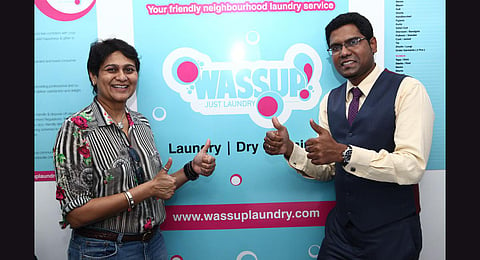

CHENNAI: Whether it’s your neighbourhood dhobi khana, mom-and-pop store or on-demand laundry service, regardless of the innovations and technological advancements, access to water continues to be the biggest stumbling block. Going by the approximate figures of Wassup Laundry, a city-based laundry and dry cleaning service, a garment consumes two litres of water for washing. Every single cycle of laundry consumes 30 to 50 litres of water. Every laundromat consumes 1,000 litres of water a day. That’s a lot of water and money involved. After studying the problem for a couple of years and keeping sustainability the prime focus, Wassup Laundry joined hands with Aeronero Solutions Private Limited, to launch a disruption in the laundry industry with waterless laundry, last week.
Water matters
Elaborating on the one-of-a-kind solution, Balachandar R, co-founder of Wassup, explains, “Wassup has introduced Qlnz technology that’s patented in association with Aeronero. The machine converts humid air into water for laundry washing through a condensation process. Water thus generated and used has a lower TDS value. It reduces the use of detergent and bleach and keeps your whites whiter and colours brighter. The outlet water is recycled 95 per cent to ensure that as we clean your clothes we do minimum damage to the water table. The residue from water recycling is organic and can be disposed of as plant manure.”
Every drop counts
While machines for water generation and recycling have been developed independently before, what sets this model apart is that it uses the combination of both to solve water problems, economically and efficiently. Giving us an overview of how the new waterless laundry is different from the existing ones globally, Durga Das, co-founder of Wassup and Aeronero explains, “There is water problem in countries like Europe. Sustainability of water is an important mandate to them, to an extent that there are solutions to treat wastewater in every home. It’s at double the cost of what we will charge for the generation and production of water. Our machine is hardly 2*2 ft and doesn’t take up much space. It’s user-friendly. We also plan to introduce it to homes and cafes.”
Delving into the science aspect of it, Durga points out, “Humidity and temperature play a role in the condensation process. In most parts of India, along the Peninsular water belt, there’s enough humidity for water to be generated. We are closer either to the Indian Ocean, Bay of Bengal or Arabian sea. However, the amount and cost of water produced varies. A machine that can produce 100 litres of water in Chennai can produce only 60 litres in Rajasthan as the humidity in the air in the latter is drier. But these are solvable problems and Aeronero is working on a prototype called Vimb that will create an environment conducive to produce water even in adverse conditions.”
Dr Kumar Loganathan, co-founder Aeronero, has been instrumental in designing the prototype, monitoring its performance and putting it to work. “If the water used is either too acidic or alkaline then it will not give the expected results on your clothes after washing. The atmospheric water generator has multiple stages of filtration which ensures all the impurities are removed from the water at all stages. Thus the final output offers a fine balance of pH and TDS. Having studied the properties and nature of water for many years, it takes time to develop a model like this in case someone has to replicate it,” explains Kumar.
Towards a sustainable future
Thanks to the younger generation who are more environmentally conscious, the team is confident that the model will be welcomed in a conservative market like Chennai. Ask him about further plans and Balachandar says, “With this technology, we are confident we will be revolutionising this industry with technology that will make a huge shift from making laundry a water source dependent business to a water source independent business. We will now be franchising Wassup Laundromats with Qlnz technology starting at 5, 12 and 15 lakh, thereby democratising the technology to ensure the spread of the idea. This will also encourage micro-entrepreneurs to venture into the field of the laundry business.” The waterless laundry machines are currently kept at their first laundromat in T Nagar. They will be introducing the machines in other stores in three months.
What wassup offers
The model is sustainable, eco-friendly and water-neutral
Every wash of a customer with Wassup can save 30 litres of water
Water generated is of the highest quality and right TDS levels to keep your whites whiter and colours brighter
The water cost is less than 10 paisa per litre, which ensures the cost of washing does not increase
For details, visit wassuplaundry.com